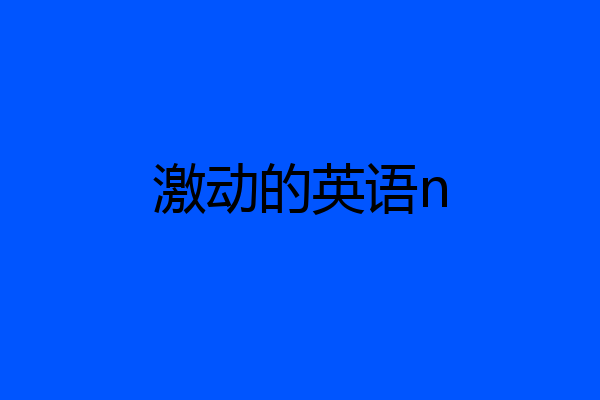
Jamietee1997
excited和exciting的区别:含义不同、用法不同、侧重点不同。
一、含义不同
excited
adj. 感到兴奋的;激动的。
exciting
adj. 令人兴奋的;使人激动的。
二、用法不同
excited
excited修饰人或带有拟人手法的物。
xcited “令人兴奋的;使人激动的”为形容词,指人、物。对....感到兴奋,是(主动地感到)兴奋,主语一般为人。
The excited fans had a fling at the lost team.
情绪激动的球迷们嘲弄输球的球队。
exciting
1811年进入英语,直接源自中古英语的exciten;最初源自拉丁语的excitare,意为使兴奋,使激动。
exciting的基本意思是“使人兴奋〔激动〕的”,具有主动意义,只修饰无生命的事物。在句中可用作定语或表语。
Skiing is more exciting than skating.
滑雪比滑冰更激动人心。
三、侧重点不同
excited
excited修饰人或带有拟人手法的物。
exciting
exciting只修饰无生命的事物。


蒋大女儿
excitement
音标:英 [ɪkˈsaɪtmənt] 美 [ɪkˈsaɪtmənt]
释义:
1、兴奋,激动,刺激
2、令人兴奋的事
3、骚动
4、刺激的因素,刺激的事物
5、振奋,激昂,奋激,鼓舞
6、兴奋劲儿,激动的情绪
7、惊动,轰动
8、动人心弦的一举
9、引起骚动的事物
复数: excitements
近义词:
1、thrill
英 [θrɪl] 美 [θrɪl]
n. 激动;引起激动的事物;震颤(医学)
v. (使)激动;感到紧张
We're immensely thrilled to learn of your success.
听说你获得了成功,我们真是兴奋极了。
2、excite
英 [ɪk'saɪt] 美 [ɪk'saɪt]
vt. 使兴奋;使激动;刺激;激起
The good news excited everybody.
这个好消息使每一个人都很兴奋。

蒙古无双皇帝
thrilled生词本英 [θrɪld]美 [θrɪld]adj.非常兴奋的; 极为激动的vt.“thrill”的过去式和过去分词网 络激动;喜不自胜的;极度兴奋地;惊喜万分

十米之上
excited
读音:英 [ɪkˈsaɪtɪd] 美 [ɪkˈsaɪtɪd]
adj.激发的;兴奋的,激动的;活跃的;受刺激的
v.使兴奋( excite的过去式和过去分词)
例句:
1、We were all excited by the news.
我们都为这消息感到兴奋。
2、Right now I'm feeling very excited
现在,我觉得非常激动。
3、It's nothing to get excited about.
这没有什么值得兴奋的。
扩展资料:
相近词义单词:
excitement
读音:英 [ɪkˈsaɪtmənt] 美 [ɪkˈsaɪtmənt]
n.兴奋,激动;令人兴奋的事;刺激,振奋
复数: excitements
例句:
1、Everyone is in a state of great excitement.
每个人都大为兴奋
2、Christmas should be a time of excitement and wonder, not a cynical marketing ploy.
圣诞节应该是兴奋和美妙的时刻,而不该是一种肆无忌惮的营销策略。
3、He opened the door and ran out in great excitement.
他打开门,非常激动地跑了出去。

继续改一个
thrilled,英文单词。可作为形容词,动词。
1、作为形容词,意为:非常兴奋的;极为激动的。
2、作为动词,意为:激动(thrill的过去式);[医] 震颤。
3、音标:英/θrɪld/ 美/θrɪld/ 。
4、例句:And then if for any reason you're not totally thrilled.
如果这些理由还不能使你完全兴奋的话。
扩展资料
1、同近义词
n.激动;[医]震颤;紧张
intensity、stress、tension、warmth、excitation
vt.使…颤动;使…紧张;使…感到兴奋或激动
tie oneself up in knots
vi.颤抖;感到兴奋;感到紧张
quake、judder
2、同根词
词根:thrill
adj.thrilling
毛骨悚然的;令人兴奋的;颤动的
n.thriller
惊险小说;使人毛骨悚然的东西;使人毛骨悚然的小说
3、词源
thrill震颤,兴奋,紧张
来自古英语 thyrlian,钻孔,打洞,穿过,来自 thyrel,洞,来自 thurh,穿过,通过,即 through 的古英语拼写形式。引申诸相关词义。
优质英语培训问答知识库